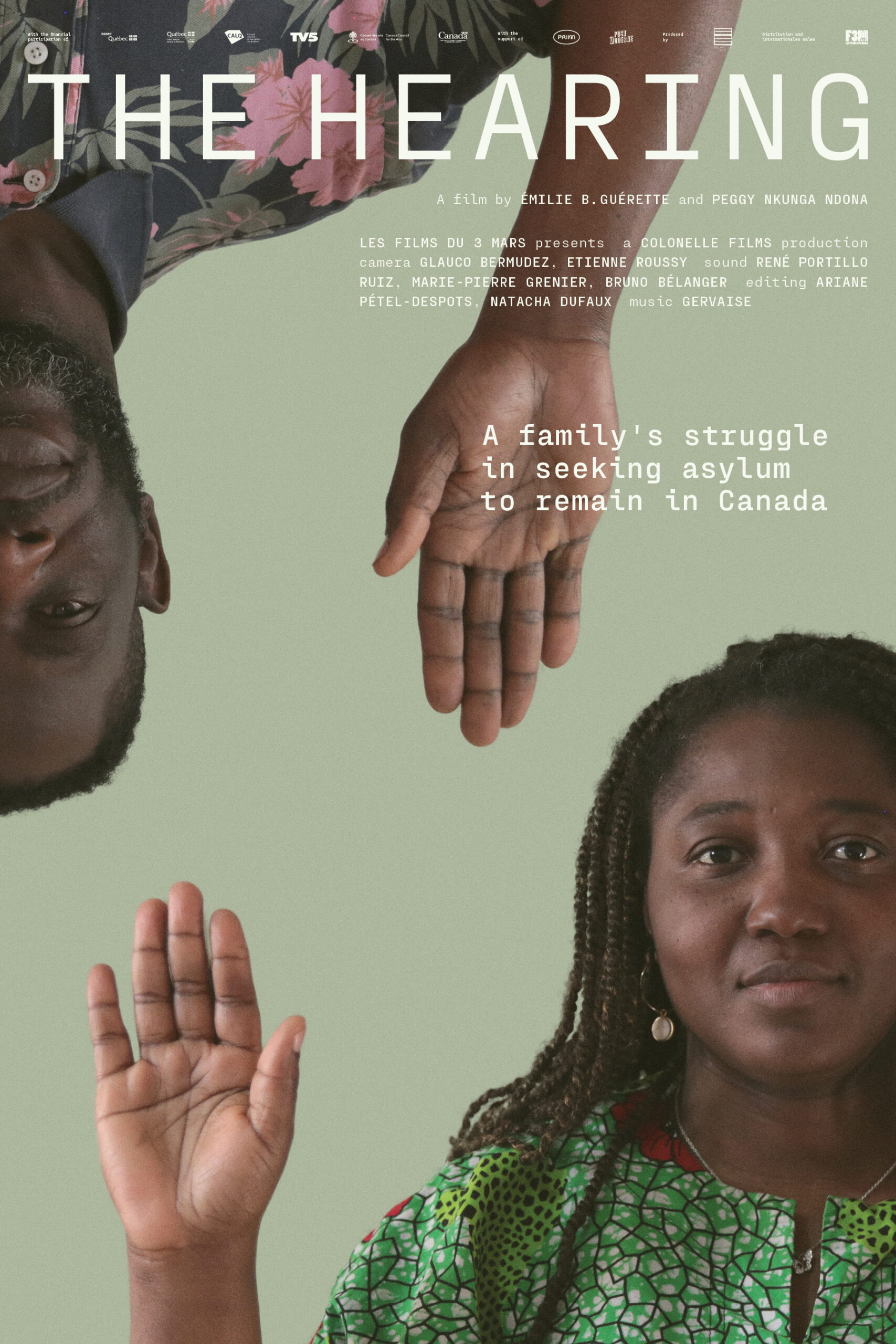THE HEARING
A film by Émilie B. Guérette and Peggy Nkunga Ndona
93 min., Documentary, Québec, Canada, 2023
After crossing 11 countries irregularly to seek asylum in Canada, Peggy, Simon and their three children are waiting for the hearing that will determine whether they get refugee status or not. Having fled political repression in the Democratic Republic of the Congo, the family tries to rebuild a peaceful life in Montreal, in spite of the constant threat of deportation. Between ghosts from the past, hopes for the future and a complex legal maze, the film delves into the struggle of the Nkunga Mbala family to remain in Canada. Offering unprecedented access to their hearing before the Immigration and Refugee Board, the film unveils the opaque process of claiming asylum in Canada.
Crew
Production : Colonelle films – Justine Chevarie-Cossette, Fanny Drew, Sarah Mannering
Script writer : Émilie Beaulieu-Guérette
Cinematography : Glauco Bermudez, Etienne Roussy
Art design : Nathalie Dubé
Editing : Ariane Pétel-Despots, Natacha Dufaux
Sound design : Marie-Pierre Grenier
Sound mix : Bruno Bélanger
Music : Daniel Baillargeon
Sound : René Portillo, Juan Fernandez







SUPPORT THE FILM
1
I’m organizing a screening
2
I’m organizing a school screening
1
I’m organizing a screening
2
I’m organizing a school screening

Beauty is an encounter . . .
between the beauty present and the gaze that beholds it.

Beauty is an encounter . . . between the
beauty present and the gaze that beholds it.
DIRECTOR’S STATEMENT
THE HEARING was born of just such an encounter: our own. We are Peggy Nkunga Ndona and Émilie Beaulieu-Guérette, two women from radically different backgrounds who nonetheless immediately clicked. Peggy, a Congolese journalist, arrived in Montreal from Brazil in 2019 after a harrowing journey along what’s been dubbed the “road of death.” Émilie, a Quebec documentary filmmaker, was interested in how Canada welcomed asylum seekers. The connection was instantaneous and powerful.
Her arrival on Canadian soil may have marked the end of a long migration, but for Peggy and her family, it was just the start of a lengthy legal quest to obtain refugee status. Together, we decided to document the process, a mix of hope, frustration and immense vulnerability in the face of a cumbersome and intimidating bureaucracy.
Our intent was to capture the sword of Damocles that hangs over the heads of asylum seekers, haunted as they are by the constant fear of being sent back to the places they had fled. Peggy wanted to tell her story and describe how her family was enduring the process. Émilie, in turn, wanted to get to the bottom of Canada’s refugee system, where each year the fate of tens of thousands plays out behind closed doors.
Exceptionally, we were allowed to film the Nkunga Mbala family’s hearing before the Immigration and Refugee Board — a first in the institution’s history. We saw how the complexity of human lives was reduced to procedural interrogation. How the claimants were at the mercy of immigration lawyers and consultants, the tenuous bridges between them and a court of law as hermetic as it was arbitrary. How exception clauses or a poorly checked box on a form could change the destiny of an entire family.
We chose to co-direct this film, one of us behind and the other, before the camera, to honour the relationship of equality we had set out to establish. For us, co-creation meant dialogue, collaboration, sisterhood, trust, faith, respect and consent. It also meant awareness of the colonial and racial power relations in which our relationship is grounded and the choice to address them honestly. If this film stems from a decolonial feminist approach, it is also very much rooted in the deep friendship that grew as the project unfolded.
We hope that THE HEARING will allow the Nkunga Mbala family to stay in Canada; we also hope it will make a difference for other asylum seekers who are up against the same process. We want Canadians to see it and be profoundly moved. Most of all, we want it to raise questions about our asylum policy, this so-called “protective” mechanism that all too often is really about exclusion.
In sisterhood and solidarity,
Peggy & Émilie


